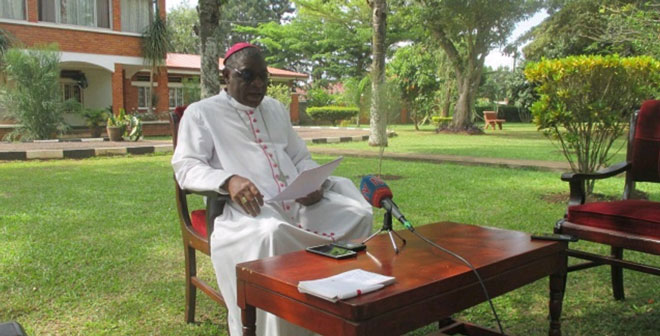
Kampala, Uganda | THE INDEPENENT | With church buildings closed and the existence of social distancing rules, several Catholics have been puzzled on how one can get the holy sacrament of penance.
Penance is also commonly known as the sacrament of reconciliation or confession in which the faithful are absolved from sins committed after baptism and are reconciled with the Christian community.
During normal times, a faithful receiving the sacrament enters the confession box and says his or her sins to a priest. Normally the penitent and priest-confessor are at a close distance.
Now, the Secretary-General of Uganda Episcopal Conference, Monsignor John Baptist Kauta, says since the sacrament in question is critical to lives of many faithful yet there are possible means of conducting it without transmitting coronavirus , the church has not suspended it.
“To address the difficulty priests and lay Christians are facing during such times we (Uganda Episcopal Conference) issued liturgical guidelines on how this sacrament can be performed. Sanitizing, wearing face masks, social distancing and other SOPs are at the centre,” says Monsignor Kauta.
As part of guidelines, Monsignor Kauta says the use of confession boxes has been banned and therefore confession should take place in a well-ventilated place. It can be in or outdoor as long as the sacramental seal is safe guarded.
Furthermore, the confessor and penitent can put seats at the recommended two-meter distance facing in the same direction to avoid facing each other directly. However, Monsignor Kauta asserts that when the penitent wants to remain anonymous to the confessor, they can put a screen and ensure that each is at least one metre from it.
With the said new normal, there have been voices in the catholic church- from lay Christians, Magisterium, and the theologians- asking for considering the possibilities involved with such means as a confession by telephone or the Internet.
However, Kauta says the Holy See has rejected the calls on the ground that the sacrament requires physical presence and interpersonal action between the penitent and priest-confessor.
He adds although the church has allowed preaching and celebrating mass via virtual collaboration tools and broadcasts, the Sacrament of Reconciliation requires that conditions for a full, natural, human conversation must exist.
Given the fact that churches are closed, Monsignor Gerald Kalumba, one of delegates helping in the administration of the vacant see of Kampala archdiocese, notes that the faithful can make an appointment with the priest in advance.
Monsignor Kalumba who is also the parish priest at Christ the King church says that although church buildings would be good areas for these confessions, a priest should not use them since they might be misinterpreted as conducting Mass.
However, in case a faithful are unable to can’t seek God’s mercy in confession under the current circumstances, he or she is advised to repent through an act of perfect contrition.
According to the Catechism of the Catholic Church perfect contrition” is sorrow for one’s sins based upon love for God, which includes the firm resolution not to commit them anymore.
The catechism explains that perfect contrition “remits venial sins; it also obtains forgiveness of mortal sins if it includes the firm resolution to have recourse to sacramental confession as soon as possible.”
*****
URN
 The Independent Uganda: You get the Truth we Pay the Price
The Independent Uganda: You get the Truth we Pay the Price


